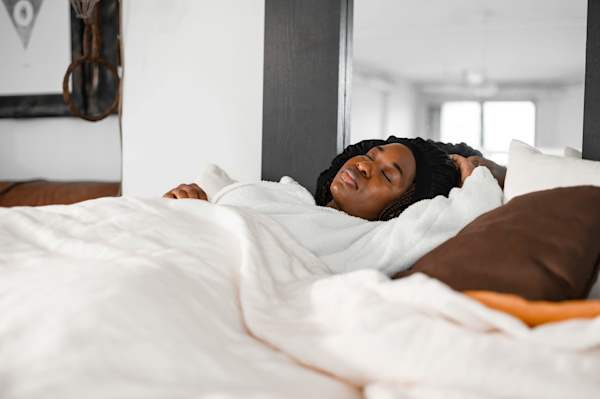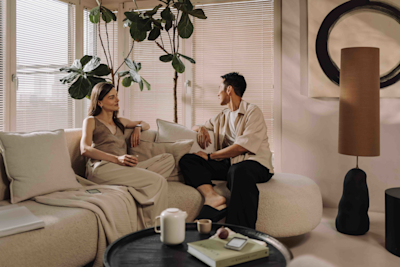
How Better Sleep Can Help Reduce Stress
Some days feel like a sprint from the moment your eyes open. We’ve got everything happening at once: emails, Slack messages, looming deadlines, traffic, tension. You power through, telling yourself you'll rest later.
But, later never really comes.
The irony? One of the most powerful antidotes to stress is something we often sacrifice first: sleep.
Many of us think of sleep as just a passive break from life. I remember telling a friend that I didn’t have time to do something and she replied, “Of course you have time, between 11pm & 7am, you’re not doing anything, but laying there, breathing.”
The truth is. (we’re covered this so many times) sleep is a vital, active process that restores your body and mind. And when it’s good (like, really good) it acts as a natural buffer against daily stress. If you're looking for a reset button, improving your sleep is one of the most effective (and underrated) ways to reduce stress.
So, let’s break down why better sleep helps lower stress, and how this simple change can transform how you feel, think, and respond to life’s inevitable challenges.
1. Sleep Helps Regulate Cortisol, Your Stress Hormone
Cortisol gets a bad rap, but it's not inherently evil. It's actually a survival hormone. It’s there to get you up in the morning and keep you alert when needed.
The problem happens when it’s constantly elevated, like a fire alarm that never stops ringing. Chronic stress pushes cortisol levels into overdrive, leaving your system frazzled.
Here’s where sleep comes in: deep, uninterrupted sleep lowers cortisol naturally. Think of it as a nightly reset. However, when you’re not sleeping well, your cortisol rhythm gets out of sync, making you feel anxious, restless, and stuck in this anxious survival mode. Sleep gives your nervous system the downtime it needs to restore balance.
READ: The impact of stress and anxiety on sleep hygiene
2. It Strengthens Emotional Regulation
Ever notice how everything feels extra difficult when you’re sleep-deprived? A spilled coffee is a catastrophe. A traffic jam seems like a nightmare that will never end. A minor disagreement turns into a full-blown meltdown. That’s not just moodiness, it’s your brain struggling to regulate emotions without proper rest.
When you’re tired, your brain’s prefrontal cortex (that’s the part responsible for decision-making, impulse control, and emotional regulation) doesn’t work as well. That means you’re more likely to react impulsively and have difficulty managing your emotions.
However, when you get enough sleep, however, this part of your brain functions optimally. You can think clearly, make better choices, and handle stress more effectively.
It really is that simple.
During REM sleep, your brain processes emotional experiences, putting them in context and helping you recover from difficult feelings. Think of it as overnight emotional housekeeping. When you sleep well, you're less reactive and more resilient. You're able to face challenges without falling apart. Better sleep doesn’t just make you less irritable, it makes you more emotionally steady over time.
3. It Boosts Cognitive Clarity and Problem-Solving
Stress often spirals because we can’t think straight. Everything feels overwhelming, decisions get harder, and minor problems snowball. However, with enough sleep, your brain functions like it’s supposed to. You’re efficient, clear-headed, and creative.
Sleep improves executive functions like attention, memory, and logical reasoning. It makes you more adaptable under pressure. Instead of reacting impulsively, you’re able to pause, assess, and act wisely. In short, sleep helps you respond instead of react.
READ: Why sleep is crucial for academic success
4. Sleep Promotes Physical Recovery from Stress
Did you know that stress doesn’t just live in your mind? It also stores itself in your body. You’ve probably experienced tight shoulders, clenched jaws, headaches, fatigue. You can stretch, get massages, meditate, breathe... but if you're not sleeping, you're only scratching the surface.
During sleep, especially deep sleep, your body kicks into repair mode: muscles regenerate, cells rebuild, and inflammation decreases. Sleep is when your parasympathetic nervous system (aka rest-and-digest mode) finally gets to do its job. This physical recovery is essential to feeling less stressed during the day.
A rested body = calmer mind.
5. It Builds Resilience to Future Stress
Here's the very important part: better sleep doesn’t just help with today’s stress. It actually prepares you for tomorrow’s challenges. Quality sleep trains your brain and body to be more resilient, which means you're less likely to be overwhelmed when things go wrong (because let’s be honest, they will. They always will).
Think of it like emotional strength training. Each good night of sleep helps you build the reserves to handle adversity.
Life won’t stop throwing curveballs, (or lemons), but when you’re well-rested, you’ll have the bandwidth to hit them back (or make lemonade).
Real-Life Scenarios & The Difference Sleep Makes
Still wondering how this plays out in daily life?
Let’s look at a few everyday situations, and how they feel with and without good sleep:
Scenario 1: Morning Rush Sleep-deprived: You wake up groggy after snoozing five times, scramble to get ready, forget your lunch, and yell at traffic. Well-rested: You wake up after one gentle alarm, feel calm, and actually notice the sunrise. The traffic still sucks, but it doesn’t ruin your day. You use the time to listen to your favorite music or catch up on some podcasts.
Scenario 2: Work Stress Sleep-deprived: A minor mistake sends you into a shame spiral. You can’t focus, and your anxiety eats up your productivity. Well-rested: You own the mistake, fix it, and move on. No spiraling. No drama. You chalk it up to a learning experience.
Scenario 3: Relationship Conflict Sleep-deprived: You snap at your partner over nothing. They get defensive. It escalates. Well-rested: You pause, listen, and talk things through like actual adults. It’s almost like magic.
It’s not that life changes. You do. Because better sleep helps you show up as your best, most balanced self.
A Quick Word About Sleep Hygiene (and How Mudita Can Help)
At Mudita, we believe that healthy sleep habits can change lives. And we don’t just say that, and we write about it all the time. That’s why we build products that make it easier to unplug and rest deeply.
Our minimalist alarm clocks, Mudita Bell and Mudita Harmony, are intentionally designed to help you wake gently, without blue light or jarring sounds. No tempting notifications. No doomscrolling in bed. Just calm, focused mornings that support your mental well-being.
Remember: Better sleep isn’t just about how many hours of shut-eye you get. It’s about creating an environment and a rhythm that supports real, restorative rest.
Final Thoughts
We often chase relief from stress in supplements, productivity hacks, or self-help books. However, sometimes, the answer is embarrassingly simple: go to bed earlier.
Protect your rest like your life depends on it, because in many ways, it does.
Yes, we know, better sleep doesn’t solve every problem. However, what it is able to do, is to give you the strength, clarity, and resilience to handle challenges with grace.
And, let’s be honest: that’s a power worth reclaiming.
Related stories

What is Blue Monday & How to Deal with Seasonal Blues
Feeling the winter blues? Discover how to overcome seasonal sadness with mindfulness, better sleep, limited screen time, and meaningful connections.

Why Disconnection Has Become a Modern Luxury
The world we live in demands constant availability. That’s why true offline time has become rare and very valuable.

Mudita Radiant Earns Kickstarter’s “Project We Love” Badge
Mudita Radiant earns Kickstarter’s “Project We Love” badge after being fully funded in just two hours. Discover our Swiss automatic field watch.
If you'd like to receive the best stories from our blog, keep up to date with our progress and get notified about our product releases and special discounts.